Drug Rehab and Alcohol Rehab in Maidstone and near Maidstone
Quick links for drug and alcohol rehab in Maidstone
- What is Drug and Alcohol Rehab in Maidstone?
- How Do I Know That I Am Ready to Start Addiction Treatment at a Drug and Alcohol Rehab in Maidstone?
- What Are the Steps Taken Before Drug and Alcohol Rehab in Maidstone?
- What Happens During Drug and Alcohol Rehab in Maidstone?
- What Addiction Treatment Options Are Available at Alcohol and Drug Rehab in Maidstone?
- What Happens Once Drug and Alcohol Rehab in Maidstone Has Been Completed?
- Would I Benefit from a Residential Programme at Drug and Alcohol Rehab in Maidstone?
- What are Outpatient Drug and Alcohol Rehab Services in Maidstone?
- FAQs About Drug and Alcohol Rehab in Maidstone
- How Do I Get Help Accessing Drug and Alcohol Rehab in Maidstone?
Each year, drug addiction costs society a total of £15.4 billion, with alcohol-related harm costing £21 billion.
Of that £21 billion, £71.2 million is spent by the NHS in Maidstone and throughout the county of Kent on cases of alcohol misuse. [1]
From 2018 to 2019, Kent had the highest number of alcohol-dependent adults in the South East, with 1 in every 100 people having an alcohol dependency. [2]
However, 54% of people in Kent self-refer to rehab services, which is much higher than the national average.
The rate of drug and alcohol crimes in Maidstone in particular and Kent as a whole indicate just how serious the problem of addiction is:
| Drug and Alcohol Crime Statistics in Kent and Maidstone | Value |
|---|---|
| Annual Crime Rate in Kent and Maidstone | 3.3 crimes per 1000 workday people |
| Crime Rate Compared to National | 119% |
| Drug and Alcohol Crime Percentage in Kent and Maidstone | 2.7% |
| Total Drug and Alcohol Crimes in Kent and Maidstone | 5.4k |
| Year-over-Year Increase in Drug and Alcohol Crimes | 28.4% |
| Drug and Alcohol Crime Rate in Kent and Maidstone | 3.3 crimes per 1,000 working people per annum |
| Rank in England and Wales Counties | 9 out of 54 counties |
Treatment outcomes for drug and alcohol rehab in Maidstone are also more successful than the national average, with 93% of individuals leaving services in a planned way.
At Rehab Recovery, we offer free advice from a team of non-judgemental professionals, many of whom are in recovery and understand how hard it can be to change your relationship with addiction.
Alcohol and drug rehab helps with addictions such as substance use disorder, alcohol addiction, opioid use disorder, binge drinking, benzodiazepine addiction, Buprenorphine addiction, cannabis use disorder, cocaine addiction or cocaine dependence, crack cocaine, heroin addiction, ketamine addiction, or behavioural addictions such as a gambling addiction.
For more information about drug and alcohol rehab in Maidstone, simply reach out to our 24/7, confidential hotline on 0800 088 66 86.
Why are Alcohol and Drugs Addictive?

Picture of a brain
Drug and alcohol addiction in Maidstone is often wrongly perceived to be a result of immoral choices made by individuals.
However, addiction is biologically classified as a disease which alters and even destroys regions within the brain that are essential for survival.
For instance, in a healthy brain, the frontal lobes help an individual to make good choices and protect the body from harm.
In contrast, when an individual begins to build up a substance dependency, the brain’s pleasure centres become overloaded.
This is because the consumption of drugs or alcohol triggers the brain to release neurotransmitters such as dopamine and other endorphins which generate feelings of euphoria.
The body will then begin wanting more and more to experience these same feelings, hence increasing the likelihood of dependency.
Overconsumption of substances can also overload sensors in the frontal lobes that usually help an individual sense and react to danger.
This can cause feelings of stress and anxiety when substances are not being consumed.
As a result, individuals in Maidstone will continue consuming drugs or alcohol to keep these emotions at bay.
What is Drug and Alcohol Rehab in Maidstone?

Outdoor photo of a residential drug and alcohol rehab centre in Maidstone
Rehab refers to inpatient treatment programmes which are designed to provide support for those suffering from a drug or alcohol addiction.
From detox and therapy to aftercare, rehabilitation facilities deliver a variety of services for individuals who are struggling to achieve sobriety at home or within the community.
All programmes at rehab in Maidstone are abstinence-based and delivered by doctors, therapists, and staff specially trained to guide individuals on their journey to long-term recovery.
If you or your loved one decide that entering a residential programme is the best course of action, you will be provided with a bespoke treatment plan tailored to your individual needs.
At Rehab Recovery, we offer free advice from a team of non-judgemental professionals, many of whom are in recovery and understand how hard it can be to change your relationship with addiction.
For more information about drug and alcohol rehab in Maidstone, call us today on 0800 088 66 86.
How Do I Know if I am Ready to Start Addiction Treatment at a Drug and Alcohol Rehab in Maidstone?

Patient and therapist having a serious conversation at a drug and alcohol rehab in Maidstone
One of the signs that you or your loved one are ready for rehab is that you want to change for the better and get your life back on track.
This could include repairing relationships with family and friends, achieving financial stability, or pursuing your dream career.
When an individual is in the depths of active addiction, they may find it difficult to look to the future and establish goals.
However, if you are beginning to feel the desire to make plans for your future, but feel that substance misuse is holding you back, this signals that you are ready to seek the treatment that you need to overcome your addiction.
Addiction is serious as there can be a number of different and dangerous effects such as Wernicke encephalopathy.
The CAGE Questionnaire at Rehab in Maidstone

Therapy group taking notes together at a drug and alcohol rehab in Maidstone
A specific method that can be used to determine whether rehab in Maidstone would be beneficial for an individual is the CAGE questionnaire.
This is a screening process consisting of 4 questions, which ask individuals whether they have ever:
- Thought that they should cut down on their use of alcohol or drugs
- Become annoyed by criticism of their drug or alcohol intake
- Felt guilty about their alcohol or drug intake
- Used substances as a morning eye-opener
In the case that an individual can answer affirmatively to two or more of these questions, this is a sign of moderate to severe drug or alcohol addiction.
They should therefore seek treatment at rehab in Maidstone.
Another test that can be used to identify whether rehab is beneficial is the Alcohol Use Disorders Identification Test or the DSM-5.
At Rehab Recovery, we offer free advice from a team of non-judgemental professionals, many of whom are in recovery and understand how hard it can be to change your relationship with addiction.
Simply reach out to our 24/7, confidential hotline on 0800 088 66 86.
What Are the Steps Taken Before Drug and Alcohol Rehab in Maidstone?

Two people having a serious conversation at a drug and alcohol rehab clinic in Maidstone
Those suffering from alcohol or drug addiction may be in denial about the pain that they are causing to themselves and those around them, which is where intervention can help.
If you are worried about a loved one and feel that they may benefit from rehab in Maidstone, interventions provide a safe space for you to make your loved one aware of how addiction is impacting others.
This is often in the form of letter reading and is aimed to encourage individuals to take a step in the right direction and commit to changing their behaviour.
Interventions should be planned out beforehand with the help of a professional, as these situations can be distressing for everyone involved.
The interventionist is therefore likely to use the Community Reinforcement and Family Training (CRAFT) approach.
Rather than dismissing negative behaviour, this encourages close significant others (CSOs) of the individual to communicate positively with them to support their recovery.
What Happens During Drug and Alcohol Rehab in Maidstone?

Friends stood together at a drug and alcohol rehab in Maidstone
Once you or your loved one has admitted that you need help and have decided to enter rehab, you’ve already taken the most difficult step.
Although recovery from drug and alcohol addiction can be a long and challenging process, it can be achieved with the professional help you’ll receive during rehab.
There are three stages that all individuals go through when embarking on their journey to recovery: assessment, detox, and therapy.
Assessment before drug and alcohol rehab in Maidstone
The first part of rehabilitation involves the medical team at your chosen treatment facility conducting an assessment.
This is likely to be performed over the phone before entering rehab in Maidstone and will consist of a discussion about your medical history.
The assessment will also involve gathering information about an individual’s drug or alcohol addiction, including:
- How long they have been using
- How often they use
- How much they consume
This will allow the rehabilitation team to recommend whether inpatient or outpatient treatment will be better for the individual.
It also allows them to begin designing a bespoke treatment plan, which will be ready to go as soon as you enter rehab.
Dual Diagnosis at Drug and Alcohol Rehab in Maidstone: Addiction and mental health

Woman speaking to a therapist at a drug and alcohol rehab centre in Maidstone
It is common for those entering rehab in Maidstone to have a mental health condition present alongside their drug or alcohol addiction, with 63% of those starting addiction treatment from 2020 to 2021 also needing help for mental health-related issues. [3]
Figures from national studies also show that diagnosis for both addiction and mental health conditions is more prevalent in Maidstone and the county of Kent than in the national population.
For instance, around one quarter of those in drug and alcohol rehab also have a mental health condition. [4]
This includes borderline personality disorder, codependency, eating disorders, obsessive compulsive disorder, post traumatic stress disorder (PTSD) and schizophrenia.
You will receive a psychiatric assessment from a psychiatrist who will assess whether you need psychiatric treatment.
At Rehab Recovery, we offer free advice from a team of non-judgemental professionals, many of whom are in recovery and understand how hard it can be to change your relationship with addiction.
For more information about drug and alcohol rehab in Maidstone, call us today on 0800 088 66 86

Person sat behind a sofa at a residential drug and alcohol rehab in Maidstone
The conditions most commonly associated with the misuse of substances include:
Known as dual diagnosis, this requires a specialised plan to ensure that the co-occurring disorders are treated effectively.
This is because substance misuse is often used to cope with the symptoms of a mental illness, so the underlying condition needs to be identified before treatment commences.
For instance, the rehab facility in Maidstone will evaluate the treatment plan that the individual is already undergoing for their psychological issues, including any medication that they are on, as well as any previous therapy that they’ve tried.
Medically Supervised Alcohol and Drug Addiction Detox at Rehab in Maidstone

Staff member typing on a laptop at a drug and alcohol rehab in Maidstone
The next stage of the rehab process in Maidstone is inpatient detoxification or detox.
This is the process whereby an individual undergoes the removal of substances from their body, to break their physical alcohol or drug addiction.
Alcohol detox is a vital part of recovery, as the medically-assisted detox uses medication such as Chlordiazepoxide ( brand name Librium) to manage the alcohol withdrawal symptoms (alcohol withdrawal syndrome) that arise when individuals stop using drugs or alcohol.
Withdrawal symptoms occur as a result of an individual’s physical dependency (physical dependence) on substances, which can become more extreme the higher they build their tolerance.
This means that they will need to consume more drugs or alcohol to experience the same effects.
Heroin addiction results in serious heroin withdrawal symptoms so it is necessary to seek professional help in rehab. You will also be able to get help with the other effects, such as hepatitis.
At Rehab Recovery, we offer free advice from a team of non-judgemental professionals, many of whom are in recovery and understand how hard it can be to change your relationship with addiction.
For more information about drug and alcohol rehab in Maidstone, call us today on 0800 088 66 86.
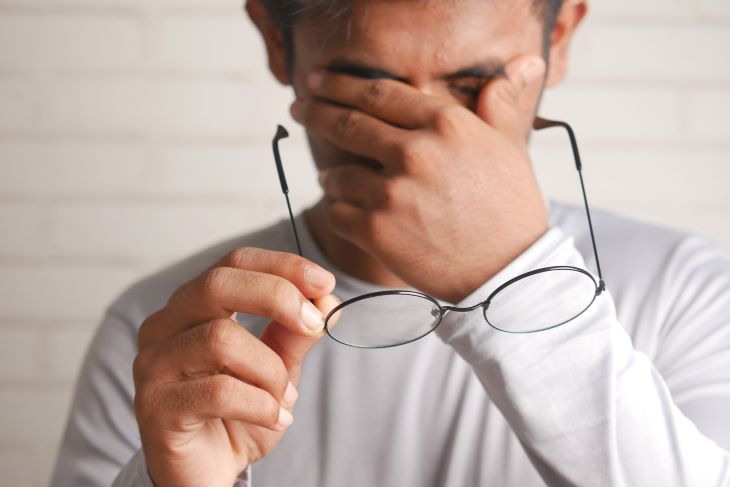
Man holding his eyes at a drug and alcohol rehab in Maidstone
Withdrawal symptoms can include:
- Nausea and vomiting
- Shaking
- Restlessness
- Insomnia
- Anxiety and depression
- Headaches
- Heart palpitations
- High temperature or chills
Withdrawal can also trigger seizures and in extreme cases cause Delirium Tremens, or sudden death.
It is therefore important for detox to be monitored by an experienced team of medical professionals at rehabilitation in Maidstone, who can ensure that you or your loved one undergo detox in a safe and manageable way.
What Addiction Treatment Options Are Available at Alcohol and Drug Rehab in Maidstone?

Two men speaking at a drug and alcohol rehab clinic in Maidstone
Once an individual has undergone a detox phase to break their physical drug and/or alcohol addiction, they will then start their bespoke treatment programme.
This part of the process focuses on addressing the psychological issues behind addiction, using a range of therapies to help the individual get to the root cause of their addiction.
Confronting these underlying causes can help to prevent the individual from using substances to cover the pain or trauma that they may be experiencing.
Therapy is therefore a crucial stage of the rehabilitation process for preventing relapse.
Depending on the needs of the individual, the types of therapy that may be offered during rehab in Maidstone include:
Cognitive Behavioural Therapy (CBT) for addiction
Cognitive Behavioural Therapy is a type of talking therapy that encourages individuals to directly address and alter the destructive behavioural patterns that lead to substance abuse.
The therapist will encourage the individual to recognise these distortions, face the issues that are leading them to use drugs or alcohol, and break these down into more manageable, less overwhelming chunks.
CBT tends to focus on the problems that subjects are currently experiencing, rather than those in the past.
Together with the therapist, the individual will then tackle problems using real-world scenarios, to deal with them practically and positively.
Dialectical Behaviour Therapy (DBT) for addiction

Woman resting her chin on her hands at a drug and alcohol rehab in Maidstone
Although it uses a similar model to CBT, Dialectical Behaviour Therapy encourages those who experience more intense emotions to understand and accept them.
The idea is that acceptance can lead to individuals being able to implement behavioural change more easily.
It therefore provides patients with the skills to manage the emotions that would typically lead them to use substances, which reduces the likelihood of relapse.
Motivational Interviewing for addiction
Motivational interviewing is a therapy that is intended to inspire individuals to want to change themselves.
Therapists will ask patients a set of specially designed, non-judgemental questions, which will encourage the individual to put their life goals at the centre of their recovery efforts.
This will give them that all-important motivation to stay strong when cravings present themselves and stay sober in the long run.
For more information about drug and alcohol rehab in Maidstone, call us today on 0800 088 66 86
Group Therapy for addiction

Therapy group speaking together at a drug and alcohol rehab centre in Maidstone
Many individuals find group settings to be one of the most beneficial forms of therapy, as they will receive support from others going through the same experience with them.
Individuals going through rehab in Maidstone will share their stories, struggles, and emotions, which helps them to form bonds with others in the group whilst on the road to recovery.
Individual Therapy for addiction
Although group therapy can be an effective way for individuals to gain the support that they need, they may also need a private space to explore issues which are personal to them.
Individual therapy will therefore give patients the opportunity to participate in one-to-one sessions with a qualified mental health worker, where they will be able to address their own emotional recovery.
Individual therapy sessions in Maidstone often consist of techniques such as DBT and CBT.
Family Therapy for addiction
For those whose drug and alcohol addiction stems from familial conflict, family therapy gives individuals the chance to work through these problems together with their loved ones.
The advantage of this form of therapy is that along with helping you to stay sober, it also offers your loved ones the chance to be part of the recovery process.
They will therefore understand what they need to do to offer you the help and support that you need once your stay at rehab in Maidstone comes to an end.
Holistic Therapies for addiction

People walking through the forest during outdoor therapy at a drug and alcohol rehab in Maidstone
From music and art therapy to horse riding and yoga, holistic therapies advocate the overall wellness of individuals.
Along with addressing drug and alcohol addiction in Maidstone, this type of therapy focuses on improving both the mental and physical health of individuals.
This allows them to find joy in a new hobby which they may not have had during active addiction, which gives individuals something to focus on as they continue their recovery.
Co-dependency Treatment for addiction
Also known as ‘relationship addiction’, co-dependency is a learned behaviour which is often developed as a result of drug and/or alcohol addiction.
Those who are affected by co-dependency, such as the loved ones of someone suffering from addiction, often sacrifice their own needs to focus on helping another person.
This type of therapy therefore aims to resolve co-dependency issues by directly addressing destructive behaviours that lead to dependency.
Twelve-Step Facilitation Therapy (TSF) for addiction
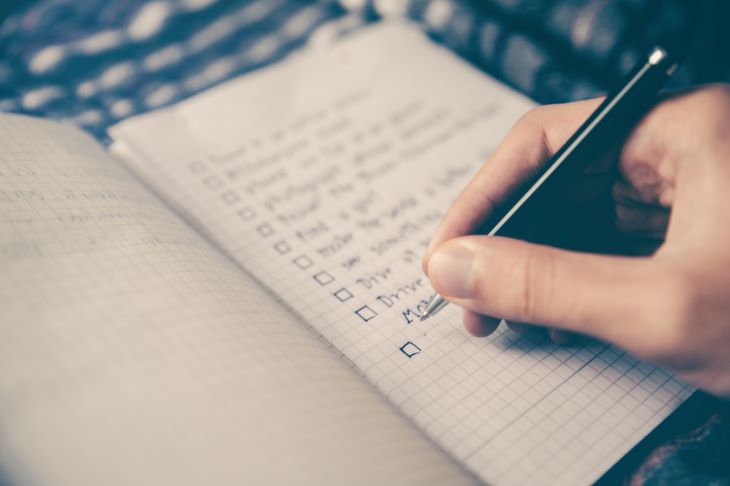
Patient taking notes at a drug and alcohol rehab centre in Maidstone
Created by Alcoholics Anonymous (AA), twelve-step therapy is a programme used by rehabs in Maidstone to help structure recovery for individuals.
The twelve steps are:
- Acceptance of the drug or alcohol addiction
- Trusting that a greater power can provide aid
- Becoming liberated by turning yourself over to that power
- Learning to understand yourself by taking a moral inventory
- Admitting our mistakes to ourselves, the greater power, and someone else that you trust
- Being ready to accept help to allow you to heal these mistakes
- Aiming for growth by asking for the power to remove your shortcomings
- Reflecting on the people you may have harmed by listing their names
- Seeking forgiveness by making amends to these people
- Continuing to admit when you are wrong to aid your recovery
- Connecting with the higher power to ask for help with things that you are struggling with
- Helping others whilst continuing to learn
At Rehab Recovery, we offer free advice from a team of non-judgemental professionals, many of whom are in recovery and understand how hard it can be to change your relationship with addiction.
Other therapy treatments that you can expect to find at rehab include Acceptance and Commitment Therapy, acupuncture, brief intervention, contingency management, drama therapy, equine therapy, Eye Movement Desensitization and Reprocessing, group psychotherapy, mindfulness, motivational therapy, music therapy, Rational Emotive Behavior Therapy and talking therapies.
Simply reach out to our 24/7, confidential hotline on 0800 088 66 86
What Happens Once Drug and Alcohol Rehab in Maidstone Has Been Completed?

Recoverees hugging at a drug and alcohol rehab clinic in Maidstone
Aftercare is the final stage of drug and alcohol rehab.
This is arguably one of the most important steps in recovery, as the resources that are put into place once an individual leaves a rehab programme are crucial for managing the risk of relapse.
Relapse Prevention Planning at Drug and Alcohol Rehab in Maidstone
Before leaving rehab in Maidstone, individuals will be provided with a relapse prevention plan.
With substance abuse relapse rates averaging at 60% at the higher end of the spectrum, this is therefore crucial for ensuring that they can maintain their sobriety in the long run. [5]
The plan will depend on the needs of the individual but often involves identifying previous or current trigger points that the individual may encounter. This could include:
- Stress at work
- Family conflicts
- Social gatherings
Together with a therapist, they will then come up with ways to deal with these triggers.
Those leaving rehab in Maidstone will also be given around-the-clock support, including regular check-ups to monitor their recovery, as well as contact details if they or a loved one are struggling.
SMART Recovery after Drug and Alcohol Rehab in Maidstone

Staff member talking to a patient at a drug and alcohol rehab in Maidstone
A technique that is often taught to individuals as part of a relapse prevention plan is the SMART recovery technique.
Self-Management and Recovery Training is a 4-point programme that provides motivational resources for individuals leaving rehab to help them to keep making good choices.
The 4 points are:
- Building and maintaining motivation
- Coping with urges
- Maintaining thoughts, feelings, and behaviours
- Living a balanced life
This technique encourages self-sufficiency so that individuals can begin to lead a more independent life in Maidstone.
At Rehab Recovery, we offer free advice from a team of non-judgemental professionals, many of whom are in recovery and understand how hard it can be to change your relationship with addiction.
Simply reach out to our 24/7, confidential hotline on 0800 088 66 86
The HALT Technique for Relapse Prevention

Black and white photo of a couple holding hands at a drug and alcohol rehab clinic in Maidstone
Another technique that individuals may be taught as part of their aftercare plan is the HALT technique.
This consists of a series of questions that those recovering from a drug or alcohol addiction in Maidstone should ask themselves when they encounter triggers in the outside world.
As opposed to giving in to their cravings, individuals are encouraged to consider whether they instead are:
- Hungry
- Angry
- Lonely
- Tired
This process is effective in preventing relapse, as it asks the individual to take the time to listen to their bodies, rather than masking their other cravings with drugs or alcohol.
Aftercare After Drug and Alcohol Rehab in Maidstone

Patients laughing together at a residential drug and alcohol rehab clinic in Maidstone
Along with a relapse prevention plan, some individuals leaving rehab in Maidstone may feel that they would benefit from further addiction treatment in the outside world.
Rehab facilities can ensure that this transition runs smoothly by referring these individuals to local support groups such as Alcoholics Anonymous (AA) and Narcotics Anonymous (NA).
These groups bring together people from a wide variety of backgrounds who are looking to continue their sobriety or get help for their addiction.
AA and NA will appeal to those who found group therapy to be effective for their recovery in a residential setting, as they provide a safe, supportive space for individuals to share both their struggles and achievements.
If you are the loved one of someone in recovery, you may be referred to Al-Anon.
As the sister organisation to AA, this is a support group for those struggling to cope with the impact of their loved one’s drug and/or alcohol addiction.
At Rehab Recovery, we offer free advice from a team of non-judgemental professionals, many of whom are in recovery and understand how hard it can be to change your relationship with addiction.
Simply reach out to our 24/7, confidential hotline on 0800 088 66 86
Would I Benefit from a Residential Programme at Drug and Alcohol Rehab in Maidstone?
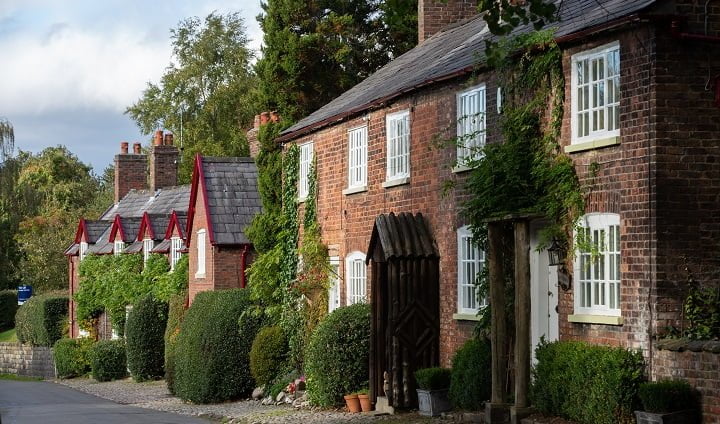
Exterior image of a drug and alcohol rehab in Maidstone
With the wide range of drug and alcohol addiction treatments that are available, it can be difficult to decide which is the best for you or your loved one.
Although outpatient treatment services do have their benefits, for the majority of individuals inpatient rehab is often the best choice.
This is the case particularly for those with moderate to severe dependency, who may experience extreme withdrawal symptoms as they go through detox.
From adjusting their medication accordingly to emotional support, these patients will benefit from 24/7 care during rehab in Maidstone to help manage their withdrawal symptoms and cravings.
This provides them with a better chance of maintaining sobriety in the long term.
Over one-sixth of those entering rehab in the UK from 2020 to 2021 were recorded as having problems with their housing. [6]
The advantage of inpatient treatment is that it gives individuals a break away from this home environment, which could be triggering.
This gives them time to focus on their recovery without the distraction of outside conflict or the temptation to use drugs or alcohol.
What are Outpatient Drug and Alcohol Rehab Services in Maidstone?

Older patient sat in a drug and alcohol rehab clinic in Maidstone
Whereas residential rehab offers a much more intensive treatment programme, outpatient services can be beneficial for those whose drug or alcohol addiction can be better managed from home.
Individuals who choose outpatient treatment will attend a medical facility for a minimum of 9 hours a week.
Here, they will receive health check-ups and therapy sessions, whilst working with a professional team to keep track of their progress in recovery.
Some individuals find recovery to be an easier process whilst surrounded by their loved ones at home, work, and in the community, giving them something to focus on outside of their addiction.
Outpatient services are also typically cheaper than inpatient rehab.
However, this type of care may not be suitable for all individuals recovering from a drug and alcohol addiction and should only be considered by those with mild withdrawal symptoms.
At Rehab Recovery, we offer free advice from a team of non-judgemental professionals, many of whom are in recovery and understand how hard it can be to change your relationship with addiction.
Simply reach out to our 24/7, confidential hotline on 0800 088 66 86
FAQs About Drug and Alcohol Rehab in Maidstone

Two friends holding hands at a drug and alcohol rehab clinic in Maidstone
How Long Does Drug and Alcohol Rehab Last in Maidstone?
When entering rehab in Maidstone, the recommended length of stay will vary from person to person.
For instance, those whose alcohol or drug addiction is more severe are likely to undergo a longer recovery process.
Some other factors which may impact how long a residential treatment programme lasts include:
- The type of treatment required
- The substances that an individual is addicted to
- How long an individual has been consuming these substances
- The guidelines of the rehabilitation facility
Those entering rehab to undergo detoxification will stay for 7 to 10 days.
However, therapy is recommended after the medical detox process to help address the underlying psychological issues that come with addiction, and to help individuals maintain long-term sobriety.
Therefore, most people entering rehab will stay from 28 days to 12 weeks, although they may remain longer if further treatment or therapy is required.
For example, 10% of people in Maidstone and the surrounding areas within Kent remain in rehab for 12 months, according to local authority statistics. [7]
What is the Cost of Drug and Alcohol Rehab in Maidstone?

Person adding up costs at a drug and alcohol rehab clinic in Maidstone
An average 28-day stay in rehab in Maidstone will cost approximately £14,000, or £3500 per week.
However, this will vary depending on the rehabilitation centre that you choose, as some centres charge higher prices to cover the cost of accommodation, facilities, and medication.
For example, some centres may charge £1500 per week, whereas others may cost up to £10,000.
Does My Health Insurance Cover the Cost of Drug and Alcohol Rehab in Maidstone?
If you’re worried about the cost of rehab in Maidstone, it’s important to know that most health insurance policies can cover this.
However, this should be checked in the terms and conditions before taking out private insurance, as including addiction may increase the price of a policy.
Not all health insurance providers cover alcohol and drug addiction, so we’d recommend providers such as BUPA and Aviva whose policies clearly cover rehabilitation treatment.
Why Should I Choose to Recover in Drug Rehab in Maidstone?

Two people laughing at a drug and alcohol rehab in Maidstone
Those suffering from drug or alcohol addiction will understand the toll that it takes on your mental health, relationships, and your finances.
So, although the cost of rehab in Maidstone may seem expensive, the investment that you or your loved one will make is worth it to regain long-term health and happiness.
The process of recovery in rehab may be difficult, but it gives individuals the chance to take a step back from circumstances that may be triggering their addiction.
Instead, they’ll receive advice from experts to help them form healthy habits.
These habits will not only help them to maintain sobriety but will also enable them to regain financial stability and repair broken relationships with friends or family members.
Individuals will also build supportive friendships with others in recovery who understand what they are going through, which will provide the motivation to remain committed to recovery.
At Rehab Recovery, we offer free advice from a team of non-judgemental professionals, many of whom are in recovery and understand how hard it can be to change your relationship with addiction.
Simply reach out to our 24/7, confidential hotline on 0800 088 66 86
What Happens During a Typical Day in Drug and Alcohol Rehab in Maidstone?

Patient and therapist talking together at a drug and alcohol rehab in Maidstone
When considering rehab in Maidstone, the thought of detoxification and intensive therapy can be intimidating.
However, it’s important to understand that a typical day in an inpatient rehabilitation centre consists of a variety of activities in a friendly, welcoming, and non-clinical environment.
For example, getting plenty of rest is an essential part of recovery, so you will be encouraged to get a good night’s sleep of 7 to 9 hours each evening.
Eating healthily and fuelling your body is another crucial component of recovery.
Patients will therefore not only receive three balanced and delicious meals a day but will also be taught how to maintain these healthy habits outside of rehab as part of their self-care.
Along with individual and group therapy sessions, rehab centres also encourage exercise, whether individuals prefer to take gentle walks or enjoy more intensive forms of activity.
Some rehab centres in Maidstone also have spa facilities, where patients can use their free time to unwind without the use of substances, receive massages, and experience aromatherapy.
What Should I Bring to Residential Drug and Alcohol Rehab in Maidstone?
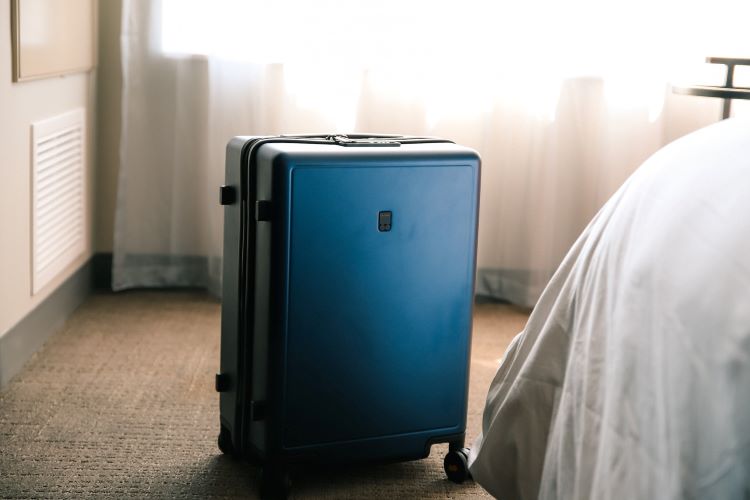
Photo of a suitcase in a residential drug and alcohol rehab in Maidstone
All items must be sealed, including toiletries and hair products.
For example, any tobacco products must be sealed and purchased brand new, to ensure that it has not been mixed with any other substances before entering rehab.
You should also bring clothing that you feel comfortable in on a day-to-day basis.
Prescriptions must be cleared by medical staff before any medication can be brought into a treatment centre.
Depending on the rehab centre, some items such as mobile phones may be prohibited, so check beforehand for everything that you can and cannot bring.
How Do I Tell My Loved Ones That I Am Struggling with Drug Addiction in Maidstone?

People talking together at a drug and alcohol rehab centre in Maidstone
It is common for those suffering from an alcohol or drug addiction to keep their struggles from their loved ones.
This is because many individuals worry about how the stigma surrounding addiction will impact their relationships with their parents, partners, and siblings.
However, at Rehab Recovery in Maidstone, we often spend time with loved ones who want to do all that they can to help their friend or family member on their recovery journey.
Having a solid support system is essential for recovery, as your friends and family can provide motivation in times when you may want to give in to your cravings.
So, if you are unsure of how to go about sharing your struggles with your loved ones, but feel that you are ready to take the first steps into drug and alcohol rehab in Maidstone, our medical staff can help to facilitate these discussions.
At Rehab Recovery, we offer free advice from a team of non-judgemental professionals, many of whom are in recovery and understand how hard it can be to change your relationship with addiction.
Simply reach out to our 24/7, confidential hotline on 0800 088 66 86
What Are Other Drug & Alcohol Charities & Organisations in Maidstone?
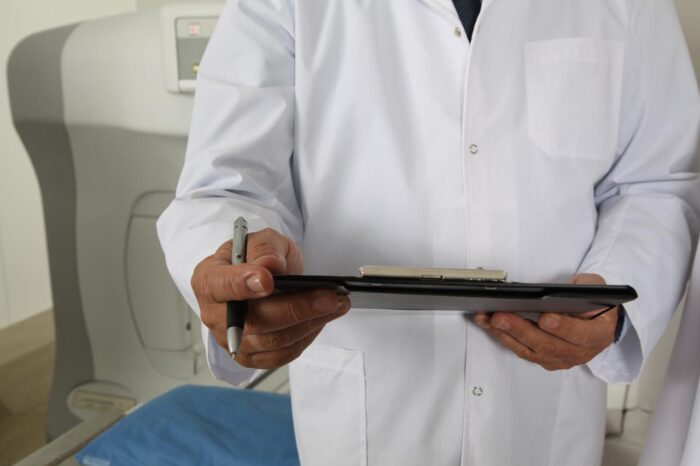
Photo of a doctor at a drug and alcohol rehab clinic in Maidstone
1. West Kent Recovery Service – Maidstone | Change Grow Live
Address: Mill House, Mill St, Maidstone ME15 6XH
Telephone: 03301 281 113
Website: https://www.changegrowlive.org/westkent/help
2. Kent Drug & Alcohol Action Team
Address: Invicta House, Maidstone ME14 1XX
Telephone: 01622 221 676
3. Turning Point
Address: 6-8 Mill St, Maidstone ME15 6XH
Telephone: 01622 690 944
Website: https://www.turning-point.co.uk/services/drug-and-alcohol-support.html
Attending local 12-Step programmes such as Alcoholics Anonymous (AA), Narcotics Anonymous (NA) or Cocaine Anonymous can be a great way to meet other people with similar goals. You and your friends and family members may also benefit from Al-Anon or Alateen meetings.
Alcohol and drug rehab is led by guidelines set by the American Society of Addiction Medicine, the National Institute for Health and Care Excellence and the NHS Foundation Trust so you are in safe hands with person-centered care.
For mental health support, reach out to Mind, Papyrus, Samaritans Rethink Mental Illness and Young Minds.
How Do I Get Help Accessing Drug and Alcohol Rehab in Maidstone?

Person typing on a phone at a drug and alcohol rehab clinic in Maidstone
The services Rehab Recovery can refer you to are available across Maidstone, Gillingham, Dartford, Chatham, Ashford, Rochester, Margate, Gravesend, Dover, Canterbury, Ashford, Sevenoaks, Whitstable, Broadstairs, Tonbridge, Aylesford, Margate, Rochester, Wye, Royal Tunbridge Wells, Appledore, Faversham, Gravesend, Tenterden, Chilham, Biddenden, Chiddingstone, Dartford, Ramsgate, Sandwich, Herne Bay, Chatham, Sittingbourne, New Romney, Fordwich, Hythe, Godmersham, Barfrestone, Goudhurst, Penshurst, Elham, Crundale, Wingham, Cranbrook, Meopham, Bethersden, Staplehurst, Minster, Bapchild, Lyminge, Elmsted, Hawkinge, Tudeley, Waltham, Otford, West Malling, Paddock Wood, Queenborough and many more towns and cities.
All of the rehabs we work with are regulated by the Care Quality Commission (England and Wales) or the Care Inspectorate (Scotland).
At rehab you will learn key coping mechanisms and if you require more long-term care, you may be able to access sober living houses in order to maintain sobriety.
At Rehab Recovery, we offer free advice from a team of non-judgemental professionals, many of whom are in recovery and understand how hard it can be to change your relationship with addiction.
Simply reach out to our 24/7, confidential hotline on 0800 088 66 86
References
[1] Kent Drug and Alcohol Strategy 2017 – 2022, Kent Police and Kent County Council https://www.kent.gov.uk/__data/assets/pdf_file/0010/79219/Kent-Drug-and-Alcohol-strategy.pdf
[2] Alcohol Dependence Prevalence in England, Public Health England, March 2021 https://www.gov.uk/government/publications/alcohol-dependence-prevalence-in-england
[3] Adult Substance Misuse Treatment Statistics 2020 to 2021: Report, Office for Health Improvement & Disparities, November 2021 https://www.gov.uk/government/statistics/substance-misuse-treatment-for-adults-statistics-2020-to-2021/adult-substance-misuse-treatment-statistics-2020-to-2021-report
[4] Kent Drug and Alcohol Strategy, 2017 – 2022
[5] Relapse Prevention and the Five Rules of Recovery, Yale Journal of Biology and Medicine https://www.ncbi.nlm.nih.gov/pmc/articles/PMC4553654/
[6] Adult Substance Misuse Treatment Statistics 2020 to 2021
[7] Kent Drug and Alcohol Strategy, 2017 – 2022


